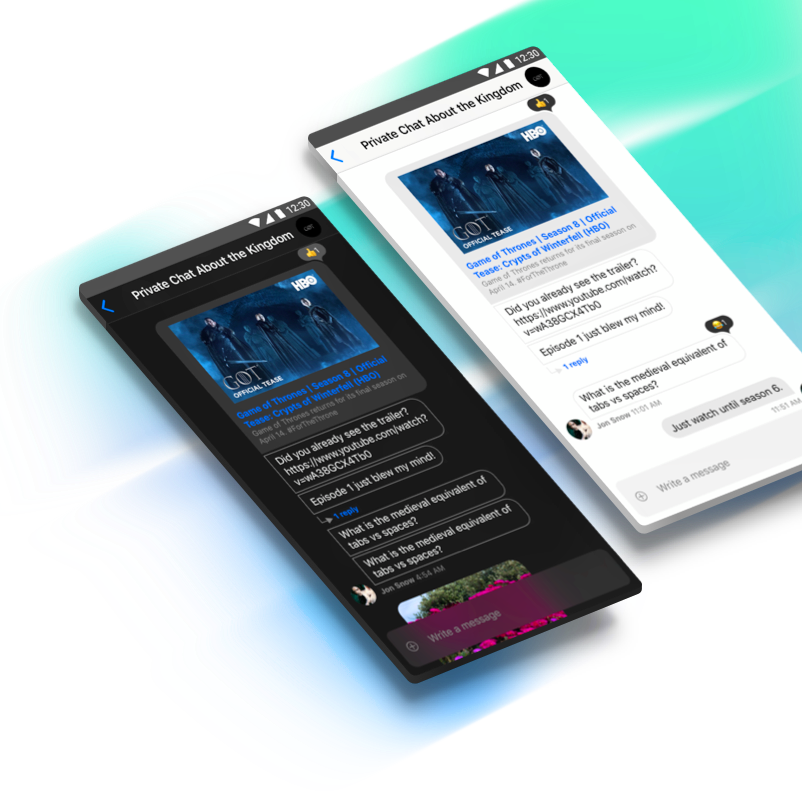Official Android SDK for Stream Chat
4.x is based on Kotlin and splits out the client, offline support and UX components. It adds seamless offline support, improved performance, makes it easier to integrate and has better test coverage.
stream-chat-android is the official Android SDK for Stream Chat, a service for building chat and messaging applications. This library includes both a low-level chat SDK and a set of reusable UI components. Most users start with the UI components, and fall back to the lower level API when they want to customize things.
Quick Links
- Register to get an API key for Stream Chat
- Java Chat Tutorial
- Kotlin Chat Tutorial
- Java API Docs
- Kotlin API Docs
- Chat UI Kit
- WhatsApp clone Tutorial
The best place to start is the Android Chat Tutorial. It teaches you how to use this SDK and also shows how to make frequently required changes. You can use either Java or Kotlin depending on your preference.
This repo includes a fully functional example app featuring threads, reactions, typing indicators, optimistic UI updates and offline storage. To run the sample app start by cloning this repo:
git clone git@github.com:GetStream/stream-chat-android.gitNext download android studio and open up the stream-chat-android folder. You'll want to run the stream-chat-android-sample app. Note that the Gradle sync process can take some time when you first open the project.
This SDK consists of the following modules / artifacts:
The SDK provides:
- A low-level client for making API calls and receiving chat events
- Offline support and LiveData APIs module
- Ready to use ViewModels for displaying a list of channels and a conversation
- Four reusable chat views:
The documentation for LiveData and the custom views is available here: https://getstream.io/chat/docs/android_overview/?language=kotlin
The low-level Chat API docs are available for both Kotlin and Java.
The Offline support and LiveData APIs docs are available for both Kotlin and Java.
- Channels list UI
- Channel UI
- Message Reactions
- Link preview
- Images, Videos and Files attachments
- Edit and Delete message
- Typing Indicators
- Read Indicators
- Push Notifications
- Image gallery
- GIF support
- Light/Dark themes
- Style customization
- UI customization
- Threads
- Slash commands
- Markdown messages formatting
- Step 1 Add repository into root build.gradle
allprojects {
repositories {
...
maven {
url 'https://jitpack.io' }
}
}- Step 2 Add library dependency into app build.gradle
See the jitpack badge above for the latest version number
android {
...
compileOptions {
//for java projects
implementation "org.jetbrains.kotlin:kotlin-stdlib-jdk7:$kotlin_version"
sourceCompatibility JavaVersion.VERSION_1_8
targetCompatibility JavaVersion.VERSION_1_8
}
}
dependencies {
implementation 'com.github.GetStream:stream-chat-android:version'
}If you're using Proguard/R8, you'll want to have a look at the proguard file we use for the sample.
Make sure to initialize the SDK only once; the best place to do this is in your Application class.
public class App extends Application {
@Override
public void onCreate() {
super.onCreate();
Chat chat = new Chat.Builder("api-key", this).build();
}
}With this, you will be able to retrieve Chat instance from any part of your application using Chat.instance(). Here's an example:
public class MainActivity extends AppCompatActivity {
@Override
protected void onCreate(Bundle savedInstanceState) {
super.onCreate(savedInstanceState);
Chat chat = Chat.instance();
...
}Connection status to Chat is available via Chat.instance().getOnlineStatus() which returns a LiveData object you can attach observers to.
Chat.instance().getOnlineStatus().observe(...);Markdown support is based on Markwon: 4.1.2.
Currently SDK doesn't support all Markwon features and limited to this plugins:
If you want to use another library for Markdown or extend the Markwon plugins you can use the code below
Chat chat = new Chat.Builder(apiKey, this)
.markdown((textView, text) -> {
textView.setText(text)
})
.build();By default, logging is disabled. You enable logs and set log level when initializing Chat:
Chat chat = new Chat.Builder("api-key", context).logLevel(ChatLogLevel.ALL).build()If you need to intercept logs you can pass logger handler:
Chat chat = new Chat.Builder("api-key", context)
.loggerHandler(new ChatLoggerHandler() {
@Override
public void logI(@NotNull Object tag, @NotNull String message) {
}
}
.build()This guide assumes that you're working on your own project in the project folder and clone the chat SDK library in a separate folder.
- First of all, you'll want to clone this repo
git clone git@github.com:GetStream/stream-chat-android.git- Next you'll edit your project's
settings.gradleand add this
include ':chat'
project(":chat").projectDir = new File("ABSOLUTEPATHTOstream-chat-android here")- Open up your
project/app/build.gradleand replace the production SDK with your local copy
//implementation 'com.github.getstream:stream-chat-android:version'
implementation project(':chat')- Next open up
project/build.gradle.
Add the following to the buildscript {} entry.
buildscript {
...
ext {
googleServiceVersion = '4.3.2'
gradleVersion = '3.5.2'
gradlePluginVersion = '2.1'
jacocoVersion = '0.1.4'
mannodermausVersion = '1.5.1.0'
}
...
}Next, set up these libraries in the dependencies. (They are needed to compile stream-chat-android)
buildscript {
dependecies {
....
classpath "com.android.tools.build:gradle:$gradleVersion"
classpath "com.github.dcendents:android-maven-gradle-plugin:$gradlePluginVersion"
classpath "com.google.gms:google-services:$googleServiceVersion"
classpath "de.mannodermaus.gradle.plugins:android-junit5:$mannodermausVersion"
classpath "com.dicedmelon.gradle:jacoco-android:$jacocoVersion"
}
}Hit build/clean project in android studio and build your app.


